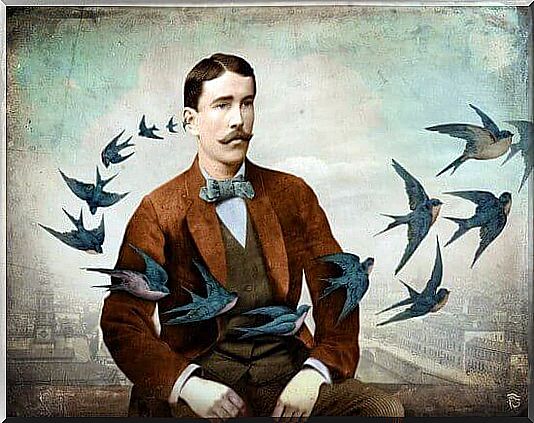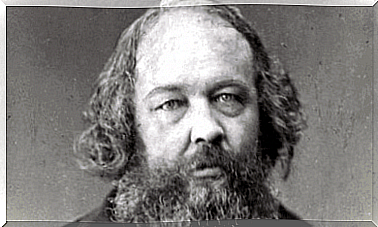The Rules Of Happiness According To Schopenhauer

Arthur Schopenhauer, a brilliant, deeply ingenious German philosopher, had a great influence during the second half of the 19th century and the beginning of the 20th century.
If we remember him, it is mainly for his clearly pessimistic position vis-à-vis the world and life, which is reflected in his main work, entitled Le Monde comme Will et Representation .
His great realism as well as the depth of his thought prevented him from seeing “la vie en rose”. Yet Schopenhauer wrote an essay with 50 rules for achieving happiness.
“Happiness” is one of those vague concepts on which, throughout history, we have never been able to agree.
Everyone agrees that it is a certain feeling of fullness and joy, but each person comes to this state for different reasons.
Moreover, many claim that it is not even a state as such, but rather a passing perception.
“The happiness of life is always having something to do, someone to love and something to look forward to”
-Thomas Chalmers-
Schopenhauer developed a concept of happiness which was based on prudence and ethics.
According to him, happiness has much more to do with inner peace than with elation or happiness. Among its fifty rules for being happy, we have selected ten that can be rewarding.

Avoid jealousy, an essential rule according to Schopenhauer
“Rule number 2: avoid jealousy. We all know how cruel and relentless jealousy is. However, we constantly strive to arouse it in others. Why ?”
Jealousy is a very negative force that can take hold of our heart and block our joy in life. Anyone who is more focused on what other people do or feel despises the task of building their own happiness.
Don’t think about the results
“Rule number 7: we must think very seriously about one thing before undertaking it, and once it is carried out, not to worry about the results, to completely let go of this thing, and not to think about it anymore”
It is simply a matter of getting fully involved in what we are doing, since it is the only thing that depends entirely on us. We must feel that we have done all we can; the rest is irrelevant.
Allow yourself to be happy
“Rule number 13: when we are happy, we don’t have to ask permission to feel happiness, nor to ask ourselves if we have reason to be”
Many people come to experience a certain surprise, even guilt, when they feel happy.
This is due to the fact that others are suffering, or that suffering is considered more commendable than joy. It is important to let go of these ideas and to be able to experience joy, without asking questions.
Control your imagination
“Rule number 18: Whether it is our well-being or our discomfort, our hopes or our fears, we must set limits to the imagination”
Goya said that “the imagination breeds monsters”. Both with our fears and our ambitions, we tend to let our imagination run free.
This is why one ends up seeing dangers greater than they actually are, as well as huge successes that it is not enough to just dream of in order to be able to achieve them.

Avoid being sad
“Rule number 22: to live happily, that can only mean one thing: to live as less unhappy as possible”
Even though it seems obvious, not everyone avoids sadness. Indeed, there are those who seek it, and of course, those who find it.
For Schopenhauer, it is healthier to avoid or even eradicate these situations which can bring sadness, because in essence, they are not worth the trouble, and are the source of new difficulties.
Valuing what we have
“Rule number 25: when we think about what we have, we must ask ourselves what it would feel if it were taken away from us: whether it is a property, our health, of our friends, our lovers, our wife / husband and our children, most of the time we only realize the value of all these things once we have lost them ”
Every morning one should wake up and think about everything to be grateful for : the chance to live a new day, to have a roof, a bed and a conscience to value what one has and that much ‘others don’t.
Entrepreneurship and learning
“Rules 30: the activity of undertaking or learning something is necessary for the happiness of the human being”
Having plans and projects brings a significant dose of enthusiasm to life. It doesn’t matter if this project is just growing a plant or cooking a nice little meal; these small businesses are a treasure.
Likewise, learning always allows us to feel that we are growing and evolving: therefore, it contributes to the happiness of living.

Take care of our health
“Rule number 32: 90% of our happiness is based exclusively on health”
When we are sick, we look at life in a completely different light; those who have suffered the rigors of pain, discomfort or limitation know it.
Health is an authentic treasure that must be taken care of in order to be able to enjoy everything else.
Show compassion for yourself
“Rule number 34: when we analyze our life and our failures, we can easily come to blame ourselves”
According to Schopenhauer, the first form of kindness is to be directed at ourselves. It is important to assess yourself, to recognize the mistakes you have made and to learn from them.
On the other hand, we should not criticize ourselves too harshly, because at the end of the day it is useless.
Prepare for the passing of time
“Rule number 35: what we despise and what we stop taking into account in our life plans most often and almost forcibly, are the transformations that time operates on us”
When you are young, you have the impression that old age is something that only happens to others. This idea pushes us to live without preparing for this future where the weight of the passing years implies new limitations as well as new vulnerabilities.
Anyone preparing for old age guarantees a better passage through this fragile stage of life.










